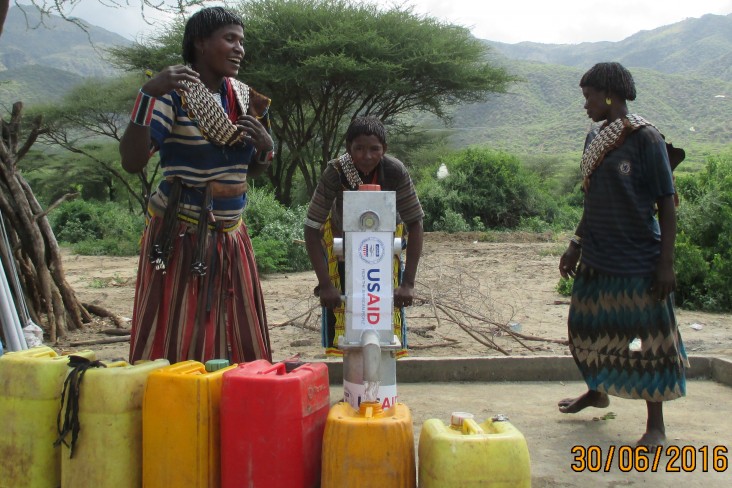
August 2016—Access to safe drinking water is critical to a community’s health and livelihood. But in rural Ethiopia, many communities lack such access. Even reaching a source of water can take several hours on foot. And these distant water sources often have to be shared with livestock, resulting in unsafe water.
One community facing such challenges is Duma Kerkele, located in the lowland area of Ethiopia. Until recently, a failing water system meant that residents had to get their water from the distant Woto River.
As Gemecho Behaillo, a 40-year-old Duma Kerkele resident with an extended family of 11 members, explains, “For the past two years since the hand pump failed, I have been walking nine kilometers to the Woto River and back carrying a 20-liter jerry can of water for my family. A closer source is the Woto irrigation canal, but the owners demand labor to be allowed to take water from there.”
USAID, in support of the Government of Ethiopia’s One WASH National Program, is working to address such obstacles to safe drinking water. In June 2016, USAID rehabilitated the shallow well in Duma Kerkele, the first of many dysfunctional water systems to be rehabilitated through the Lowland WASH activity. The community also committed to responsible use of the pump, for example, preventing overuse for watering livestock.
The rehabilitated well now gives about 350 people easy access to safe water.
“The new hand pump saves me a lot of time and will improve the health of my family,” said Gemecho.
USAID also is providing training to ensure local operation and maintenance of the water systems for long-term sustainability.
In collaboration with the regional and zonal water bureaus and woreda (district) water offices, USAID has identified 25 priority woredas for water-related construction and rehabilitation. Priority was given according to low water supply coverage, population density, numbers of dysfunctional water systems, and surface or groundwater potential.
Rehabilitating dysfunctional water systems will improve access to clean water and provide a rapid and effective response to alleviate the effects of the recent drought. USAID’s Lowland WASH activity aims to promote widespread adoption of key hygiene behaviors, improve efficiency and sustainability of food production, and increase access to improved drinking water sources and sanitation facilities for approximately 1 million people.
LINKS
Follow @USAIDEthiopia, on Flickr, on YouTube, on Facebook







Comment
Make a general inquiry or suggest an improvement.